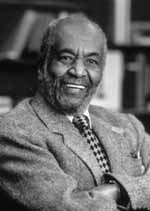The Mellon Visiting Minority Scholars Program at Teachers College
The Institute for Urban and Minority Education at Teachers College, Columbia University has received $300,000 from The Andrew W. Mellon Foundation to bring several visiting minority scholars to campus each year over the next three years beginning in the fall of 2002.
Commenting on this new grant, Professor Edmund W. Gordon, Director of the Institute for Urban and Minority Education said, "As an institution that historically has led the effort to improve education for populations that are underserved, the College is grateful for this opportunity to bring to campus these outstanding minority scholars. The ideas and perspectives of these scholars will help the College pursue its principal activities of researching the critical issues facing education, educating current and future leaders, encouraging the national debate on what is best for education, and improving educational practice, all with a view to the advancement of academic excellence and social justice."
The grant provides $100,000 per year, which will cover honorariums, travel, and housing for the visiting scholars, as well as expenses for several gatherings of local scholars to meet the visiting scholars; and an annual summative paper on the minority education issue developed by the visiting scholars and selected Teachers College faculty.
Lydia L. English, the Director of the Mellon Foundation Minority Fellowship Program, called the Visiting Scholars Program, "an opportunity over the next three years for the college to bring on a diverse group of senior scholars from all over the country to present their research and scholarship and to bring an enhancement, not only to Teachers College, but to the whole Columbia community."
Visiting scholars will invigorate the Teachers College community intellectually, bring new and outside perspectives and ideas to graduate students and faculty, and address theoretical and practical issues that impact the relationship between minority students and high academic achievement. The duration of visits and the responsibilities of the scholars at the College will vary. Responsibilities will include at least one public lecture open to the College University and the local Morningside Heights and Harlem communities.
English spoke about the role of the scholars. "Each of the scholars that have been invited for the next academic year have different research foci, they are coming from different perspectives, that will add enhancement of their research where perhaps there isn't research right now, presently in the College. So I see it as an opportunity for the Columbia and Teachers College community to hear about these things and to learn about a wide breadth of research going on, on different issues in higher education and in education in general."
Scholars will also co-teach graduate classes, lead small discussion groups with faculty and graduate students, consult concerning ongoing research and participate in public panels or debates. The scholars will have office space and housing at the College that will encourage interaction with other scholars and students at Teachers College and the University.
The College's various research centers and institutes, in particular the Institute on Urban and Minority Education, will provide opportunities for the visiting scholars to work on their own research projects and to participate in the on-going work of the appropriate host center or institute.
Each year the program will focus on a theme or issue relevant to minority education. The 2002-03 theme will be Uncoupling High Academic Achievement from Class, First Language, and Race. The visiting scholars, who will represent a range of academic disciplines, will, in their lectures and presentations to the College and local community, focus on scholarship that bears relevance to the year's theme.
A conference at the College in the spring of each of the three years will convene scholars from many disciplines for several days. The conference will focus on the year's theme. The visiting scholars will be invited to this event to make presentations. From the conference a monograph will be developed that will summarize the issues raised and conclusions drawn over the year and make recommendations for policy and action. The monograph will be disseminated to policymakers and education leaders. The theme, the conference, and the monograph will assure that the visiting scholars interact and make connections with one another, even if their times at TC do not overlap.
John Huston Stanfield, one of this academic year's Mellon scholars, presented a colloquium at IUME on October 9th called "Peer Cultures and Hierarchies of Schooling Control: Implications for Black Male Status Attainment." Stanfield is the Chair of Indiana University Bloomington's Department of African-American and African Diaspora Studies who previously served as Executive Director of the Morehouse Research Institute in Atlanta. A sociologist, Stanfield holds degrees from California State University, Fresno, and Northwestern University. His research and publications focus on race relations and desegregation and their impact on academic achievement. Stanfield's 1993 book, A History of Race Relations Research, won the Gustavus Meyer Center 1994 Best Book Award on Racial Intolerance in North America. He is currently writing a book entitled Empowering Each Other: Academics and Community People Working Together.
Stanfield spoke about why he is serving as a Mellon scholar. "I think that it's very important in this day and age for American institutions for higher learning to creatively pluralize perspectives in areas like education. It is an opportunity for me to share some of my research interests and findings, which have a different cultural twist than conventional areas of analysis. I just see this as one more example to broaden the net, so to speak, the intellectual net in regard to research."
Speaking of his lecture, Stanfied said, "My talk is going to be on an area having to do with the need to look at the different ways in which intellectually gifted black males are discovered, cultivated and how they go about basically utilizing their talents. I will be speaking on Martin Luther King as an adolescent and as a child and the discovery of his talent and his development eventually into a world leader."
Published Monday, Feb. 24, 2003

